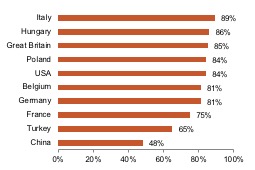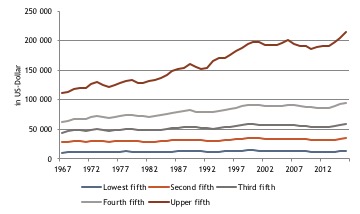
Frank Schwichtenberg via Wikimedia Commons
Social Cohesion in the United States and Germany: Will Protectionism and Income Redistribution Be Helpful?

Jörn Quitzau
Bergos AG
Joern Quitzau is a Geoeconomics Non-Resident Senior Fellow at AGI. He is Chief Economist at Bergos, a private bank based in Switzerland. He specializes in economic trend research and economic policy. Joern Quitzau hosts two Economics podcasts.
Prior to his position at Bergos, Joern Quitzau worked for Berenberg in Hamburg (2007-2024) and Deutsche Bank Research in Frankfurt (2000-2006) with a special focus on tax and fiscal policy.
Dr. Quitzau (PhD, University of Hamburg) was a Visiting Fellow at AGI in April 2014 and September 2022 and an American-German Situation Room Fellow in April 2018.
While the economy is booming, society is drifting apart. Social cohesion is showing cracks and political stability is in many places in danger. Partitioning is again becoming an issue. These outlined tensions are occurring in many countries at the same time, as many election results have clearly shown in recent years. The election of the newcomer Donald Trump as U.S. president, the decision of the British people to leave the European Union, and the creeping (and in some cases rapid) decline of the major popular parties in many European countries are striking evidence of the tense situation.
Chart 1: Social division is an international phenomenon
Percentage of respondents who consider their country “rather divided” or “very divided”

With his slogan “America First,” Donald Trump has made it unmistakably clear that he blames globalization— at least partially—for domestic tensions. With the help of customs duties, he intends to protect or revive American industry. German chancellor Angela Merkel, on the other hand, apparently blames misguided developments with respect to social policy for the increasing division of society. In her first government declaration of the new legislature on March 21, 2018, she announced that she will strengthen social cohesion and intends to use social policy instruments in particular. However, whether protectionism and redistribution are the right tools is questionable.
Income Distribution
The advantages of globalization and its positive impact on growth are more than obvious and therefore not to be discussed here. Nevertheless, there are normative aspects and issues regarding income distribution that are worth taking a look at: Globalization produces winners and losers. From a welfare economic perspective, winners must be able to compensate losers so that the winners are better off while the financial position of losers is at least not negatively affected. This is the approach of economic theory to the distributional aspects of globalization. As trade liberalization and free capital and labor markets boost economic growth, globalization generates financial scope so that compensation for the losers is possible—in theory. In real life, however, there is no guarantee for such compensation. Germany, with its social welfare state, provides social security for those who lost their jobs due to globalization or other reasons and for those who are unable to help themselves. In the United States, there is no such social welfare state. Hence, in the U.S. there is potentially greater discontent about globalization. This is all the more important because citizens or, to be more precise, voters do not look at the macroeconomic effects of globalization and other policy measures but at the individual results for their own incomes. Data on income distribution shows that the inflation-adjusted incomes of the lower half of the income scale have not increased for several decades (see Chart 2). When a large part of society does not benefit from the general economic development over such a long period, and at the same time sees how a relatively small part of society is becoming ever wealthier, it should not come as a surprise that dissatisfaction is spreading. Experiments have shown that for many people, well-being depends not only on the level of their own income, but also on their relative position within the income pyramid of a country.
Citizens or, to be more precise, voters do not look at the macroeconomic effects of globalization and other policy measures but at the individual results for their own incomes.
Chart 2: Unequal income distribution in the U.S.
Average values of income quintiles, in USD

Cultural and Political Aspects
Nevertheless, if distribution and social issues were the most pressing topics, then Donald Trump would hardly have been the first choice to solve the problem (and the Democrats would have elected Bernie Sanders to be their presidential candidate). In Germany, the SPD would have achieved a better election result. There are indications that social and economic issues are not primarily responsible for social tensions in the U.S. or in European countries. The problem is more complex.[1] It seems that cultural and political aspects and the question of how people live together within their respective societies play an important role.
Social division is an indication that common sense and common ground have been lost over time. However, common ground forms the foundation for social cohesion. With shared values, experience, backgrounds, language, religion, and perspectives, greater agreement is leading to a more harmonious society. In addition, living together is facilitated by laws governing human interaction. The importance of law-abiding for the functioning of a society is obvious. Extremely important, although less frequently taken into account in public discussion, are the unwritten laws and informal rules and norms. They have often grown over many years, decades, and even generations. They do not apply universally, but differ in different regions, countries, and cultures. In addition, over time they are subject to a certain change, which can be triggered by very different things, such as technology, education, migration, or by the generations to come. If change takes place at a rapid pace, friction can arise because the established way of life is put to the test and at least parts of the unwritten laws and informal rules and norms lose their function as guidelines of social behavior, without there yet being consensus about the future guidelines.
If change takes place at a rapid pace, friction can arise because the established way of life is put to the test.
These similarities have eroded over time due to various reasons. The long-term trend toward individuality and diversity encourages individuals to construct and cultivate themselves as exceptional.[2] Up to the 1970s, societies were characterized by standardization and uniformity. Now particularity, individuality, and self-realization are the prevailing characteristics. Thus, the relatively homogeneous and less polarized society is over. Cultural differences are also celebrated between people of originally similar background (for example, with regard to nationality, ethnicity, religion), and their connection fades into the background. Common ground is still to be found within milieus, but barely across all milieus within the entire society, which is instead fragmented.
The dividing lines with which certain sub-groups generally differ from others are very different. Some move along nationality, others along regions, or between urban and rural populations. Very often, however, the dividing lines simply run along different lifestyles. The American political scientist Charles Murray argues in the light of this development that in addition to financial inequality, cultural inequality is a crucial challenge of our time. Murray’s analysis is not based on different nationalities or different cultures, but solely on “White America.”[3] According to his analysis, a new upper class has emerged in the U.S. which he describes as a “cognitive elite” whose skills greatly benefit from the economic and technological realities of our time. This new upper class cultivates a common culture, living largely secluded from the rest of American society and thereby losing a sense of the problems that affect them. If this analysis is correct, then demarcation is a phenomenon that affects virtually all strata of society, including those who are particularly strongly opposed to demarcation. With this new upper class, demarcation is less obvious because its members are typically networked across all borders with like-minded people so that it seems cosmopolitan—unlike those milieus whose salvation is in regional or national demarcation.
Dwindling Trade-off Ability
The market economy has also contributed to tensions. Citizens are pampered by the market because they are getting exactly what they want. While they get the products that fit their preferences (within their financial capabilities), citizens need to be content with one-size-fits-all solutions to public goods that are offered by the state. The ability to compromise that is needed for this is hardly available in a fully differentiated, hyper-individualized society. The tensions in market-dominated high-income countries show how important it is to combine an efficient liberal economic system with values based on common ground.[4]
Values
Constructive discussions about values are difficult to achieve, at least in Germany. Traditional values and virtues, which had shaped coexistence in recent decades as the overall social code of conduct, came under pressure and were often considered obsolete in the public debate. Public discussion was increasingly dominated by the progressive academic part of the society whose values often had nothing in common with the values of the majority of the population. Sometimes their proclaimed values were even perceived as an affront by sections of the population. Ultimately, however, a change in values was introduced in parts of society, thereby individualizing and pluralizing the scaffolding of values. For the individual, this may be a gain, but for coexistence in society, the juxtaposition of different values holds the potential for conflict because these different values may meet throughout life and possibly collide.
Economic Policy Implications
Good economic policies take people as they really are (not as they should be).[5] Endowed with a differentiated world view and a global horizon, interested in global grievances just as much as in their own problems—such cosmopolitan people could be used to found a global society. In fact, the majority of people do not (yet) fulfill these conditions. The majority is still primarily concerned about their own happiness. In addition, the coexistence with like-minded people in rather small units and the preservation of their own identity is given a high value. The openness to other lifestyles, to other cultures, and to rapid change, however, is much weaker. If the majority of society does not consist of cosmopolitans, then the process of globalization must be cautiously shaped. Free trade is less problematic than migration, as uncontrolled immigration further strengthens the fragmentation of society. Immigration policy therefore plays a particularly important role. If growth was less aggressive, social stability would be higher. Therefore, smaller growth losses are the price for higher social stability. The conclusion of the Transatlantic free trade agreement (TTIP) should not be a problem, however, because it would be concluded between two economic areas which are comparatively similar in economic terms. Thus, there would be no significant pressure on wages in contrast to free trade with low income countries.
In Conclusion
It is unlikely that social tensions will be overcome in the foreseeable future. The causes are too complex for individual policies to contribute to relaxation. The U.S. president’s trade policy will hardly strengthen the cohesion of American society. “America First” may be an attempt to re-establish identification within the country, but the appearance of the American president is not inclusive and therefore counterproductive. Neither will the intended social policy measures of Chancellor Merkel significantly improve the irritable mood in German society, because economic and social problems are probably not the most pressing issues for the majority of Germans in this respect.
What can Germany and the United States learn from each other? The development in the United States shows Germany that the freedom of the individual must be accompanied by a social consensus on values and the rules of living together. Too much diversity can be a problem, as the members of a society in certain areas of life (for example: public goods) have to agree on a common denominator. Whether an agreement on common values (or even on rules of living together) will be feasible, remains to be seen. In the past, every German discussion about a “mother culture,” which ultimately is nothing more than an agreement on common values and manners, has been nipped in the bud. The ideas about what forms the mother culture show the dissonance between the different social groups. Conservative and urban-progressive circles are unlikely to find a common denominator and the radical edges only make it more difficult. It will be a tough job.
Germany, on the other hand, can serve as an example to the U.S. of how to generate more inclusive growth with a broad education system and a welfare state, where the welfare system assists the individual temporarily in their attempts to return to employment. Since Americans apparently are far more interested in freedom than in solidarity and redistribution through a welfare state, education is seen to be more important than social benefits, whereby education and training are the best prerequisites for a safe and well-paid job.
A longer report is available in German here.
[1] See William A. Galston, Anti Pluralism – The Populist Threat to Liberal Democracy (New Haven, CT: Yale University Press, 2018).
[2] See Andreas Reckwitz, Die Gesellschaft der Singularitäten (Berlin: Suhrkamp Verlag, 2017).
[3] See Charles Murray, Coming apart – The State of White America, 1960-2010 (New York: Crown Forum, 2012).
[4] See Quitzau, Jörn (2018), Menschenbild, Marktwirtschaft und Politik, in: Ordnungspolitisch stets auf Kurs – Festschrift zum 65. Geburtstag von Prof. Dr. Norbert Berthold, von Nadya Kosturkova und Jörg Rieger (Hrsg.), Vahlen Verlag.
[5] With respect to the political situation in the US, Mark Lilla argues that “Reaganism endured because it did not declare war on the way most Americans were living and thinking about themselves. It fitted right in.“ And he addresses to the Liberals: “We go into politics with the country we have, not the country we might wish for.” See Lilla, Mark (2017), The Once and Future Liberal – After Identity Politics, HarperCollins Publishers, p. 24.









